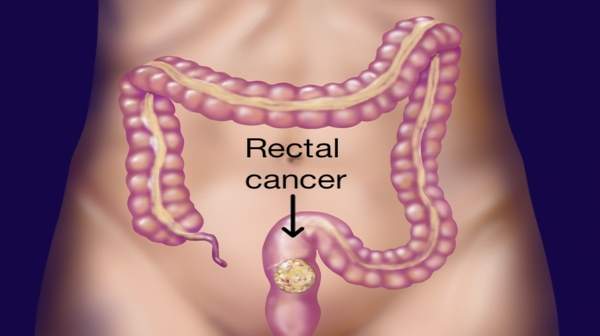What's in this article?
Rectum Cancer Overview
The rectum is the lower part of the colon that connects the large bowel to the anus. The rectum’s primary function is to store formed stool in preparation for evacuation. Like the colon, the three layers of the rectal wall are as follows:
- Mucosa: This layer of the rectal wall lines the inner surface. The mucosa is composed of glands that secrete mucus to help the passage of stool.
- Muscularis propria: This middle layer of the rectal wall is composed of muscles that help the rectum keep its shape and contract in a coordinated fashion to expel stool.
- Mesorectum: This fatty tissue surrounds the rectum.
In addition to these three layers, another important component of the rectum is the surrounding lymph nodes (also called regional lymph nodes). Lymph nodes are part of the immune system and assist in conducting surveillance for harmful materials (including viruses and bacteria) that may be threatening the body. Lymph nodes surround every organ in the body, including the rectum.
Like colon cancer, the prognosis and treatment of rectal cancer depends on how deeply the cancer has invaded the rectal wall and surrounding lymph nodes (its stage, or extent of spread). However, although the rectum is part of the colon, the location of the rectum in the pelvis poses additional challenges in treatment when compared with colon cancer.
Rectal Cancer Symptoms
The symptoms of rectal cancer may be similar to those of other bowel diseases, like ulcerative colitis, Crohn’s disease or even colon or colorectal cancers. Often there are no early symptoms of rectal cancer. However, as the cancer develops, rectal cancer symptoms may become more persistent and severe. Whereas, people with an inflammatory bowel disease (IBD), like ulcerative colitis or Crohn’s disease, may experience periods of remission where the symptoms subside.
Rectal cancer signs
The development of tumors in the rectum or anal canal may change the consistency, shape or frequency of bowel movements. The severity of the symptoms may increase or more symptoms might arise as the cancer spreads throughout the rectum or into the colon. Rectal bleeding may make the stool bright red. A bleeding tumor may also change the color of the stools, sometimes making the stool very dark or tarry looking.
Rectal cancer signs related to bowel habit changes may include:
- Diarrhea
- Constipation
- Not being able to completely empty the bowel
- Change in the size or shape of stools (narrower than usual)
- Bloody stool (either bright red or very dark)
General rectal cancer symptoms
Early stages of rectal cancer may have no symptoms. However, more systemic (body-wide) changes may result as the tumor goes deeper into the layers of tissues lining the rectum or if the cancer spreads (metastasizes) throughout the body.
Generalized symptoms of rectal cancer may include:
- Pain in the rectum
- Abdominal pain or discomfort
- More frequent gas pains or stomach cramps
- Feeling bloated or full
- Change in appetite
- Unintended weight loss
- Fatigue or tiredness
There are several screening methods available that can detect polyps or cancer. A screening may make it possible to find the cancer before symptoms appear.
Rectal Cancer Treatment Stage by Stage
Rectal cancer is staged much the same way as is colon cancer, but because the tumor is much lower down in the large intestine, the treatment options may vary.
Stage 0 Rectal Cancer
In Stage 0 rectal cancer, the tumor is located only on the inner lining of the rectum. To treat this early stage cancer, surgery can be performed to remove the tumor or a small section of the rectum where the cancer is located can be removed. Radiation treatment, given either externally (beamed in from the outside) or internally (radioactive beads are placed inside the rectum) may be considered.
Stage I Rectal Cancer
Stage I rectal cancer is another early form or limited form of cancer. The tumor has broken through the inner lining of the rectum but has not made it past the muscular wall. Treatment usually involves:
- Surgery to remove the tumor
- If the tumor is small or you are very old or sick, radiation alone can be used to treat the tumor. This hasn’t proven to be as effective as surgery. Chemotherapy can also be added to heighten the effect of radiation.
Stage II Rectal Cancer
Stage II rectal cancer is a little more advanced. The tumor has penetrated all the way through the bowel wall and may have invaded other organs, like the bladder, uterus, or prostate gland. However, lymph nodes are not involved at this stage. Treatment includes:
- Surgery to remove all the organs involved with the cancer (wide-resection)
- Radiation with chemotherapy is given before surgery, or after surgery; chemotherapy alone is given for 4 months after surgery.
Stage III Rectal Cancer
In Stage III rectal cancer, the tumor has spread to the lymph nodes (small structures that are found throughout the body that produce and store cells that fight infection). Treatment includes:
- Surgery to remove the tumor
- Radiation with chemotherapy before or after surgery
- Chemotherapy, if elected, after surgery
Stage IV Rectal Cancer
In Stage IV rectal cancer, the tumor has spread to distant parts of the body (metastasized), often to the liver and lung. The tumor can be any size and sometimes is not that large.






